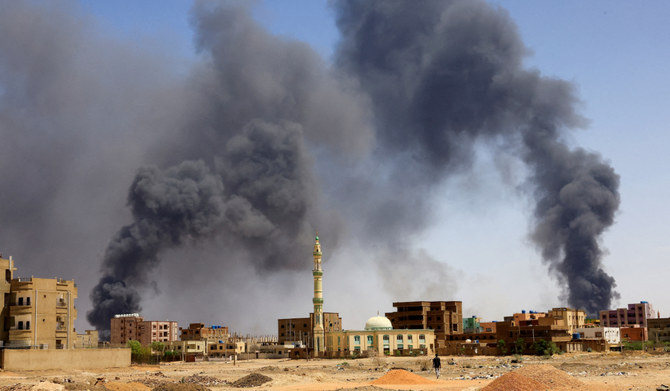UNITED NATIONS: The UN Security Council urged Sudan’s warring parties on Friday to immediately halt hostilities during the Muslim holy month of Ramadan and allow aid to get to 25 million people in desperate need of food and other assistance.
Ramadan is expected to begin on or around Monday, depending on the sighting of the crescent moon.
The 15-member council voted overwhelmingly in favor of the British-drafted resolution, with 14 countries in support and only Russia abstaining.
Sudan plunged into chaos in April, when long-simmering tensions between its military, led by Gen. Abdel Fattah Burhan, and the Rapid Support Forces paramilitary commanded by Mohammed Hamdan Dagalo broke out into street battles in the capital, Khartoum.
BACKGROUND
Britain’s deputy UN ambassador James Kariuki urged the Sudanese armed forces and Rapid Support Forces ‘to act on this united international call for peace and to silence the guns.’
Fighting spread to other parts of the country, especially urban areas, but in Sudan’s western Darfur region it took on a different form, with brutal attacks by the Arab-dominated Rapid Support Forces on ethnic African civilians. Thousands of people have been killed.
UN Secretary-General Antonio Guterres urged both sides on Thursday to support a Ramadan ceasefire, warning that the nearly year-long conflict threatens the country’s unity and “could ignite regional instability of dramatic proportions.” The African Union also backed a halt to fighting during Ramadan.
Burhan welcomed the UN chief’s appeal, but the Sudanese Foreign Ministry issued a statement on Friday listing a number of conditions for a ceasefire to be effective. The Rapid Support Forces have not responded.
The resolution expresses “grave concern over the spreading violence and the catastrophic and deteriorating humanitarian situation, including crisis levels, or worse, of acute food insecurity, particularly in Darfur.”
Britain’s deputy UN ambassador James Kariuki urged the Sudanese armed forces and Rapid Support Forces “to act on this united international call for peace and to silence the guns.”
The Security Council urged the warring parties “to seek a sustainable resolution to the conflict through dialogue,” and Kariuki called on the two sides to work to restore peace.
Russia’s deputy UN ambassador Anna Evstigneeva accused the Security Council of “double standards” – calling for a ceasefire in Sudan and “dragging out” adoption of a resolution calling for a ceasefire in the Israel-Hamas war in Gaza, pointing to US vetoes of a ceasefire resolution and calling this “hypocrisy.”
She claimed most elements in Friday’s resolution are already being done, stressing that ending the violence shouldn’t just be the aim of the Security Council “but most importantly of the Sudanese people themselves.” Nonetheless, Russia decided to let the resolution through “because it is a question of the lives of the Sudanese people who are suffering across the country from the consequences of the conflict,” she said.
According to the UN humanitarian office, 8.3 million people have been forcibly displaced by fighting between government and paramilitary forces, half of the country’s 51 million people need aid, and 70 percent to 80 percent of health facilities aren’t functioning.
UN humanitarian chief Martin Griffiths said if a Ramadan ceasefire is observed by both sides, “I can assure you we’ll be piling in the aid and repositioning, repairing institutions, getting children out to safety and so forth.”
The number of Sudanese who are hungry and “food insecure” has increased by 10 million since last year because of the conflict, he said, warning of moves toward famine because of “disinterest” in the Sudan conflict by the rest of the world.
Griffiths told a group of reporters Friday that he has personally been trying to get the rival commanders together in person or virtually to agree on access for humanitarian aid and workers, so far unsuccessfully.
“What we need is a political process,” he said, stressing that instability in Sudan has an impact beyond its borders because of its strategic location.
The impact has been seen in neighboring Chad, which is hosting over 550,000 Sudanese refugees mainly from neighboring Darfur as well as the Central African Republic and westward through Africa to the Sahel, Griffiths said. In addition, Sudan borders the Red Sea where Yemen’s Houthi rebels are attacking ships to try to spur a ceasefire in the Israel-Hamas war in Gaza.
Griffiths said the $2.7 billion UN humanitarian appeal for Sudan this year is just 4 percent funded and urged donors to respond urgently.
He welcomed France’s announcement last month that it will hold a ministerial meeting in mid-April to help Sudan and its neighbors deal with the humanitarian consequences of the conflict.
Addressing the Security Council on Thursday, secretary-general Guterres pointed to renewed offensives and growing fears of a further expansion of hostilities in eastern Sudan, calls for arming civilians in various states, and armed groups entering the fighting in western Darfur and South Kordofan.
But Sudan’s Foreign Ministry on Friday set conditions for a ceasefire, saying the RSF should withdraw from all provinces they have taken control of since the conflict erupted, return all “looted” public and private property and stop human rights violations including “atrocities” their fighters have committed especially in Darfur.
In blaming the RSF for the ongoing conflict, the ministry said, “We are certain that the terrorist militia that launched a war against the state and the people in Ramadan last year has no moral, religious or national obligations that would make it respect the sanctity of the holy month.”
Two decades ago, Sudan’s vast western Darfur region became synonymous with genocide and war crimes, particularly by the notorious Janjaweed Arab militias against populations that identify as Central or East African.
The International Criminal Court’s prosecutor, Karim Khan, said in late January there are grounds to believe both sides in the current conflict are committing possible war crimes, crimes against humanity or genocide in Darfur.




























